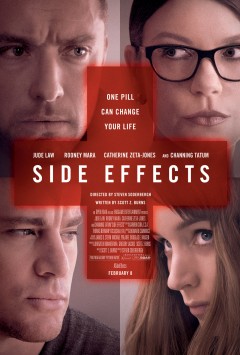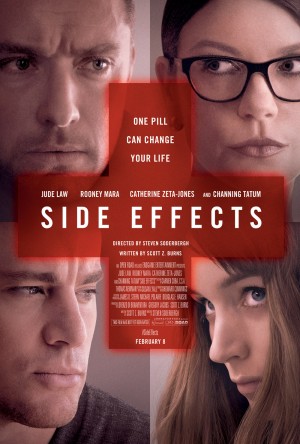
Steven Soderbergh’s latest film, Side Effects, uses the modern themes of high finance and psychiatry to fashion a plot that grows increasingly riveting as the story unfolds. The script features some very classic elements of tale-spinning executed with adroitness, while the director’s realistic, subtle style makes a great complement. What is more, there are all kinds of themes and subtext of interest to the libertarian, who will nod knowingly throughout the film, even if the filmmakers take a neutral position and give no indication whether they are too.
There are a number of plot points that pull the rug out from underneath the viewer, turning points that completely alter what the movie appears to be about. By the time we find out the true nature of the story, a few of these twists have already occurred. This makes it difficult to know how to summarize the film.
The movie is a suspense thriller of sorts, but distinct from most thrillers in the way it is executed. Soderbergh does not use slow-motion, close-up cuts or insistent music to belabor points and hit the audience over the head. He films and edits in a simple, subtle style. This is not to say that the movie is hard to follow, but Soderbergh does treat us like adults. When a character is dissimulating, for instance, this fact will not be spoonfed to the viewer. There will be no close-up of the actor’s face as he makes the kind of expression that has come to be a clue that he is tricking someone, the kind of expression that, if a person made it in real life, would instantly give him away.
MILD SPOILERS MILD SPOILERS MILD SPOILERS
It begins with a young woman, Emily Taylor (Rooney Mara), and her husband Martin (Channing Tatum) trying to get their lives going again after Martin’s stint in prison for the “crime” of insider trading. Emily suffers from depression and sees a psychiatrist (Jude Law as Jonathan Banks). When she tries a new drug called Ablixa, her symptoms seem to be cured, but are replaced by episodes of sleep walking. During one of these episodes, she murders her husband. Dr. Banks is called to testify on her behalf during the trial, but there are more surprises in store, and behind it all are indications of a conspiracy.
END OF SPOILERS
The acting, as one would expect, is the cinematic version of realistic. That is to say, you would never mistake it for a recording of real-life, extemporaneous interactions, but it is not overly dramatic and has just enough polish to make it run smoothly, not so much that the life is taken out of it. All the actors feel like real people and either make us care about them, hate them, or alternate between the two.
The best part is the construction of the plot, which melds two different realms together, Wall Street and pharmacology/psychiatry, to make something that will keep you fully invested and guessing throughout. One plot twist is followed by another, but all of them logical, and there is no shortage of twists. There came a point where I was afraid they would try to shake us up one more time even though the constraints in place by that point would not have permitted yet another twist that could be called plausible. Fortunately, there were no more to come. The filmmakers hit the optimal number and left it there. They show excellent restraint all around, from the judicious use of surprises to the way each scene is filmed.
As mentioned above, the story tellers take the neutral position of merely relating the tale. Their position is so neutral, in fact, that the story was well into the second act before I could be sure who the sympathetic protagonist was supposed to be. The portrayal and recording of each character give nothing away, with the possible exception of Victoria Siebert (Catherine Zeta-Jones), whose depiction on screen might be construed as giving the faintest of hints. At any rate, after seeing her a couple times an embryonic bias grew in my mind.
However neutrally the tale is related, the libertarian is going to have some strong opinions about things that transpire. Above all, he will note that however reprehensible the behavior of certain characters, their actions were triggered by a situation the government created. Other acts are made possible by government force, whose application in this circumstance is not entirely unjust but whose potential for abuse is obvious. It would give away too much to relate all the details, but I will say that the non-crime of insider trading figures prominently, as does the impermissible power of a psychiatrist to lock a person away whether they have committed a crime or not.

There are only two things I would point out as flaws in the film, and one of them is not truly a flaw so much as a missed opportunity. The scenes are brief flashes of plot points without much development in themselves. The overarching story is developed nicely, but the scenes do nothing other than serve this purpose. This is in stark contrast to a film like Inglourious Basterds, whose scenes are miniature virtuoso stories in themselves while also contributing to the larger story that makes up the movie. Side Effects has simple scenes without much set up and without much complexity of composition or of interaction. The greatest movies, in my opinion, are works of art at every level, and Side Effects falls short on that count.
There is also a question of believability in one aspect. There is an element of central importance in the plans of some of the characters that is largely out of their hands. They must trust fate to come through for them, or all will be for naught. Fate comes through, although this is not discovered until later, and I suppose this can be forgiven since the movie would not be itself without it. Nevertheless, a little more attention to this aspect might have yielded an improved product, although it is not a glaring problem.
Last year’s winter season gave us The Grey, which turned out to be, for my money, the best movie of the year. Side Effects is this winter season’s early surprise, and a pleasant one like its predecessor. There is nothing about it that demands a large screen viewing, but if a person enjoys the theater experience for itself, Side Effects is a good choice to make for that night out.
















Comments on this entry are closed.
Dan O. February 14, 2013 @ 6:46 pm | Link
Awesome review Matt. This is a sleek and stylish genre entry with a keen sense of irony, impeccably made and paced.
Matthew Alexander February 14, 2013 @ 7:56 pm | Link
Thanks, Dan! I agree with you. It’s always nice when a film of this quality shows up in theaters.